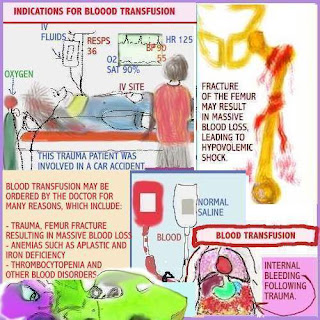LIVER FAILURE AND RENAL FAILURE- QUIZ QUESTIONS

The patient with cirrhosis of the liver Scenario: Mr.X was admitted to the hospital with a diagnosis of liver failure. He is awake, but lethargic. His abdomen is distended ( ascites) and his foley catheter has low urinary output, which is tea colored. He is short of breath and the doctor has ordered oxygen via nasal cannula. Mr.X's ammonia level is high due to liver failure. Lactulose ( po) has been ordered by the doctor. The patient in liver failure may develop hepatic encephalopathy. This results in altered mental status and possible coma. This may be an indication for ICP monitoring. THE LIVER The liver is the largest organ in the body. It lies in the right, upper quadrant of the abdomen. It's functions include: - detoxifies harmful substances and stores glycogen, vitamins and minerals - metabolizes protein and carbohydrates - produces and excretes bile which is used to emulsify fats, tu...



